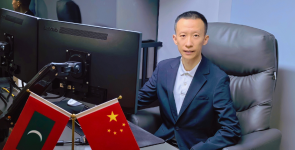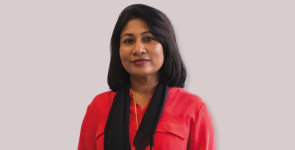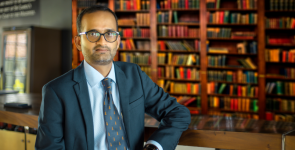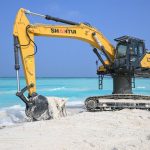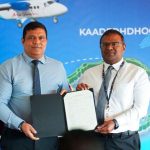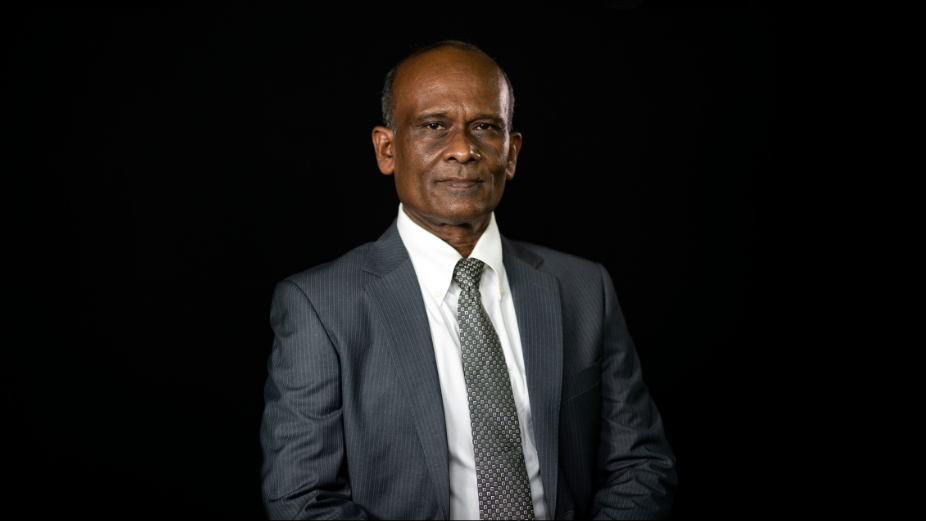
Captain Abdullah Saeed is the Managing Director of Maldives State Shipping (MSS) – a shipping and logistics company right here in the Maldives. Our team sat down with Captain Saeed to find out more about the beginnings of the company and what it has achieved so far.
Could you tell us a bit about your career thus far?
I started my career as a seafarer by being a cadet on a ship, then later becoming a master mariner and commanding vessels. After I left the sea, I did further studies in business and was working with several local companies before I joined the government. I worked in the government for 3 years, from 2008 to 2012. Thereafter, I was working abroad and returned to the Maldives in early 2020 and that is when I got the opportunity to work for Maldives State Shipping (MSS).
Could you give us an introduction to the company and what prompted the formation of MSS?
Maldives State Shipping is a subsidiary of State Trading Organization (STO). It all started because STO has the task of importing staple goods for the Maldives. Throughout the years, they found that they needed a shipping line to serve the country. Hence, STO announced for a consultant to look into what can be done and that’s when I joined them as a consultant. We worked together in studying the prospects of container shipping to the Maldives. Finally, I told the STO management that once we start a container shipping line and start carrying third party cargoes, it will be better to have a subsidiary. This is because when the claims come, the entire organization need not be affected. So, I think this is why a subsidiary was formed, but the intention of starting a container shipping service was purely an initiative by STO under the direction of the President. It’s also because it’s necessary for them to evolve, in order to better serve the nation.
In the context of COVID-19, there’ve been major disruptions in the global shipping industry. How has MSS addressed the challenges of the pandemic?
When we started operations in April 2020, right after our first call, Male’ went into lockdown and work-from-home was introduced. So, we had to meet all these disruptions caused by COVID-19 head on at the very beginning.
In retrospect, it’s an advantage that we started with all this bad news, but we managed to run the organization even though it was very difficult. We had to find other means to build the network which we needed to start the services of MSS. Somehow, we managed to overcome the difficulties. Slowly, we started getting more cargoes and we managed to sail through this pandemic. It was also very exciting at that time because we were looking after all the imports of the necessary personal protection gears and what was urgently required by the country.
We had done voyages with very few containers just because our main aim at that moment was serving the country to overcome this pandemic. Globally, a lot of ports were locked down and even if some ports were working, they had limited hours for customs and other clearing offices to function. We had this difficulty all over the world. One of our feeders is from Colombo to Male’. So, when Sri Lanka was going through the same thing, the gates were open for a couple of hours every day and we had to organize everything to use that window of time we got. All of this had to be done through Teams and other electronic communications, as there was no chance for any of us to physically be in Colombo to ensure these things went smoothly. We didn’t have that opportunity to be present in person. It was a very difficult undertaking, but as I said before, in retrospect, it’s a good thing that the pandemic came during the early days of MSS.
What do you consider to be the greatest success of MSS?
I believe, overall, if you look at the period in which we started and what we have done, the entire MSS, the whole operation is a success. So, I wouldn’t specifically point out which particular one is a great success, I can’t pinpoint it like that.
We have managed to do some new things like direct cargo services to the Southern Atolls, and direct cargo through India’s cargo ferry to the north as we happen to be their agents for Shipping Corporation of India (SCI). The direct cargo services to the atolls are something new in the Maldives and we are the first company to do this. Earlier, occasionally, vessels have gone to the islands directly but on a project basis.
For example, when Shangri-La and Herethere were constructed in Addu, ships had called with cargoes, but these are all project cargoes. What we introduced is a direct cargo service from abroad directly to Addu, meaning traders in Addu can import directly to Addu instead of Male’, thereby getting the advantage of the duty concessions and also a lot of savings on freight. That is something remarkable and in line with the decentralization policy of the government.
Another thing is that we were able to tie up with all the major mainliners serving the Maldives including Maersk and Hapag Lloyd, and CMA CGM. The general flow of cargo to Male’ from anywhere in the world, we will be able to address it now. In my view, this is a huge achievement for MSS, as we were only two years in operation during a period where we couldn’t travel or meet face to face. While it is not the ideal time to start anything, we managed to somehow bring up the company to a profitable venture.
How is MSS helping to develop human resources in the Maldives?
From the very onset, we planned to develop the human resources of the country. We believe that seafaring is a good career opportunity for our youth. MSS is very proud that we are paying international wages to our seafarers with our first vessel. I also think it’s become public knowledge that we are offering very good salaries compared to the other Maldivian companies.
The fact is that we are trying to provide a salary which anyone can receive even from a foreign company. In other words, what we are trying to do is attract the Maldivians to work for the Maldivian companies rather than working abroad. So, to achieve that, we had to match the salaries to the ones offered by foreign companies. We have also successfully employed a majority of Maldivians as part of our crew, except for one or two lower rank members.
At MSS, the aim is to develop human resources and give opportunities for young people to become seafarers either as an engineer or navigators or even as a captain. We have also now announced fully funded scholarships. Currently, we are offering this scholarship for navigation officers, engineering officers and a reefer technician. We will be adding more people and more areas in the future like electricians, mechatronics and also welding. We will keep on introducing more courses and opportunities for people to develop their skills.
I believe that as a state company, our focus should not only be on making a profit but while serving the nation, developing the human resources as well.
What’s in store for MSS in the future? What can we expect to see next?
MSS will become a full-fledged shipping company. We will be expanding and diversifying, meaning we will not only be doing containers but we will be doing bulk cargoes, both dry and liquid, as well as special project cargoes. These are the areas which we will expand into in the future. Currently, we are only focused on the Maldives and serving the Maldives, but soon, we will be exploring other short-sea areas and trying to utilize these opportunities so that MSS can become a full-fledged international network on its own. The idea is for MSS to become a container liner service that is initially covering Asia, but later on, all over the world.





